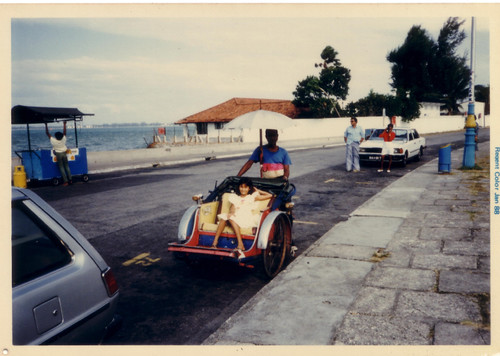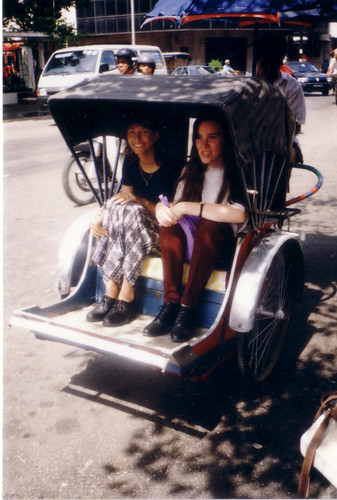At my previous job I had a colleague, Faridah, who grew up in a small village called Kampong Nyak Puteh on Penang Island on the West coast of Peninsular Malaysia. Penang is a vibrant multicultural place that has a long history of immigration from many corners of the globe. It is now a popular tourist destination and has also become quite industrialized which has lead to massive changes in the lifestyle of the local people.
"The Rickshaw is called bacha in bahasa but in Penang we called it Langcha I think its Chinese origin"

Little girl in Langcha Kampong Nyak Puteh 1980.

Langcha by the sea Penang 1980's

Yasmin and friend ride the Langcha in Penang 1990's
Nyak Puteh is no longer there it was re-claimed by the Government at the end of a 99yrs lease. All the land previously occupied by Faridah's Family was lost.The village which was once a simple and pleasant place to live, is now gone.
There was a stream that flowed with clean water; people were accustomed to sharing the fruit from several neighborhood fruit trees and Rickshaws were a common and much valued form of public transport. Unfortunately the village was replaced by blocks of flats designed for high density living. Faridah tells me:
"Now there is no more fruit trees or beautiful river eveyone has a small courtyard for themselves and that is all"
Faridah says that the Langcha riders were once well respected in her village but with industrialization and modernization they do not have such a significant role in the daily lives of those who live there now.
2 comments:
Wrong-minded modernization: rickshaw bans
A new wave of rickshaw bans has just occurred in Dhaka. How appropriate were those bans? How sound are the arguments against rickshaws?
The rickshaw has for decades been attacked by the media and others in Bangladesh as being slow, causing traffic jams and thus congestion, being an inhuman occupation for the pullers, and holding Dhaka back from modernization. Just how true are those claims?
First, does the experience with rickshaw bans to date suggest that such bans effectively reduce traffic congestion? On the contrary; even government reports show that rickshaw bans do nothing to improve traffic, and sometimes traffic speed even further deteriorates following rickshaw bans. In addition, people’s travel cost as well as time increase. Are VIP roads free of traffic congestion? Will the government blame rickshaws for congestion until there are no rickshaws left, and then what will they blame? Cities around the world with no rickshaws waste millions of dollars in lost time and wasted fuel due to traffic jams caused entirely by cars. Why are we so eager to join them?
http://dhaka-rickshaw.blogspot.com/2011/04/wrong-minded-modernization-rickshaw.html
Thanks for this very pertinent comment Mr Syed! Modernization may not be what they think it is!
Post a Comment